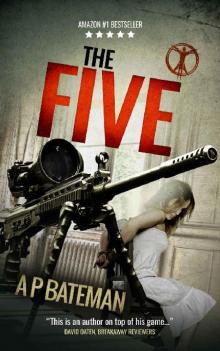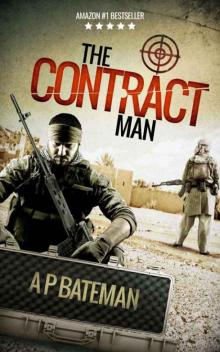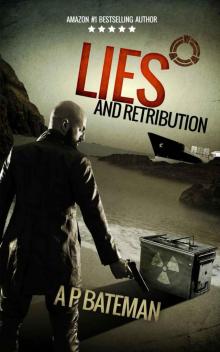- Home
- A P Bateman
The Contract Man Page 7
The Contract Man Read online
Page 7
Stewart nodded. He knew. He had lost his first wife also. But he’d moved on too quickly and had two successive divorces as a result. Not until he had started working in training and administrative roles had he found a solid relationship for himself. And by then he had been too old to start a family. His wife Margaret was a divorcee with three grown children of her own, but he had missed out on a family of his own and regretted it every single day.
“Well, maybe it’s for the best at the moment,” Stewart paused somewhat awkwardly. “I’ve always said all the best agents are single and childless. Nothing clouding their judgement…” He looked at King and nodded towards his packed travel bag. “Ready to save the world again?” he asked with a wry smile, trying to break the sudden tension.
“Ready to do the dirty work for somebody else,” King replied. “But it beats the Hell out of me sitting here and wondering if it’s all worth it…”
“Well, worth it or not, I hope you’ve left a note for the milkman, you may be gone for some time…”
16
They pushed him backwards and he fell heavily onto the concrete floor and rolled into the centre of the room, unable to make any attempt to break his fall with his hands bound tightly behind his back. The two guards laughed callously, then bent down and dragged him across the room to the single wooden chair, where they sat him down and roughly dispensed with the stifling hood.
Abdul Tembarak breathed deeply, almost feeling light headed as the sudden rush of air entered his grateful lungs. He glanced up at one of the soldiers and immediately wished that he hadn’t. The guard lashed out, catching him across the face with a painful, open-handed slap then turned to his companion and grinned. The two soldiers both laughed. Abdul smarted at the blow and kept his eyes towards the floor, not wishing for more of the same. He knew that this was merely the warm up before the main event. He had listened to former prisoners, the lucky ones, the few who had left the camp alive. They had told of the many men and woman brought here for interrogation, the ones who had been lost in the system, or more often, the ones who had simply not made it to the next morning. He stared at the floor and tried to remember his training. His mind was fogging over, too preoccupied with thoughts of his wife and child.
The two soldiers had stopped laughing, and had walked around him towards the heavy steel door of the cell. They hovered near the door for a moment, talking in low voices, then switched off the light and closed it.
Abdul raised his head and looked round the room, but could see nothing in the complete darkness. He shifted on the wooden chair, easing himself into a more comfortable position, shifting his weight away from the vast areas of bruising.
The soldiers had come for them at a little after midnight. There had been no warning, no telltale sign, not even to Abdul Tembarak’s well-trained ear. The doors and main windows had been assaulted simultaneously and within seconds the house had been full of soldiers and the beatings had begun. The hoods had been expertly applied, and their limbs bound tightly with the plastic duct tape. The soldiers had then begun to search the house and during the ensuing commotion, Abdul had clearly heard an authoritative-sounding woman asking a soldier where the couple’s baby was.
He knew when he had been spotted, knew the exact damning moment. The bank was full of people on General Madi Soto’s payroll. The MB & C Bank of Indonesia handled all of Soto’s official accounts, so it was only obvious that the man would have eyes and ears in place.
This was to be Abdul Tembarak’s brief: to infiltrate the MB & C Bank of Indonesia’s head office in Yogyakarta and look into General Soto’s accounts. He was to identify inside contacts and follow them to possible outside contacts, or go-betweens. Cover identities and histories, known as legends, had been created for Abdul and his wife and the couple had been housed in the bank’s adequate accommodation.
As far as Tembarak’s wife was concerned the posting had been just another short-term accountancy contract that her husband had taken on a freelance basis. As a forensic accountant he had various contracts all over Indonesia. The couple lived well and travelled every few months. She was unaware of his intelligence work. To the manager and the staff of the bank, Abdul Tembarak was working on behalf of the accountancy department of the bank’s headquarters, MB & C International, in Jakarta. He was undertaking a new initiative within the bank’s infrastructure, random auditing and evaluation of accounts.
He had worked for the past seven weeks and had positively identified two of General Soto’s informants; a woman who worked in Accounts and a man who had recently been promoted into Foreign Investments. He had followed them to their independent liaisons and suspected that neither informant was aware of the other’s presence at the bank. That had not surprised Tembarak; it was typical of General Soto to run a single cell system, which would reduce the chance of the pair getting to know each other. Tembarak had followed the young man to his liaison for the third time in as many days, but had become over-confident. He had got too close. When the man had taken a quick, cursory glance around, Tembarak had been in full view. He had reacted casually, smiling and acknowledging the chance meeting, but deep down he had known that he had aroused the informant’s suspicions. From then on, it seemed as if the young man was onto him. Every time he looked up from his paperwork, the man from Foreign Investments was staring at him. Every time he went for a coffee break, or to lunch, the man from Foreign Investments was near. Even the unavoidable toilet break was fast becoming embarrassing.
Tembarak had contacted his controller within the Internal Security Service, but the man had been reluctant to withdraw him. The information he had already gathered had been invaluable. It was purely down to Tembarak’s efforts that the government now knew the full extent of General Soto’s plans for a leadership bid, and details of his subsequent funding from what, upon further investigation, had turned out to be a bogus company in China. There was also money coming in from accounts held in Switzerland and the Cayman Islands, the money transferred there from various IP addresses, but two had been traced to a Chinese investment group in Hong Kong. The Internal Security Service controller advised his agent to keep his head and continue to uncover more vital information. Easily advised from the safety and comfort of an air-conditioned office. That last conversation had been two days ago, now Abdul Tembarak sat alone in the blackness of a concrete cell.
He bowed his head, thinking of his young wife and child. Ignorant of the fact that her husband was a government agent, ignorant that her presence had unwittingly provided his cover, time and time again. Soon the tears started to flow, before long, Abdul Tembarak was sobbing out loud, grieving for the death of their union and the fate which certainly awaited his wife at the hands of their captors. He knew that he would die here. What he had a small chance of controlling was when. If he could keep his wits he might have be able to barter a deal for his wife. And if he could hold on long enough, his absence may just be noticed.
17
Alex King stood at the front door of his cottage, waiting for Stewart to return with his vehicle. He had watched the man trudge across the field, back towards the road, smiling at the sight of him picking his way through waist-high thistles in a smart, double-breasted, navy suit. It had not occurred to Stewart to take the lane adjacent to the house, which led straight to the road, and it had only briefly occurred to King to tell him. Instead, he had decided to remain silent, much preferring to watch.
King looked out across the patch of garden, and the overgrown fields beyond. He had intended to turn the property around from near dereliction, into a dream home, a chocolate box cottage. It had been his dream since his early childhood in Lambeth. Growing up on a council estate, with only his mother supporting five children, times had been hard. With his two sisters sharing their small bedroom and his mother and string of lovers taking up the flat’s largest bedroom, the young Alex King had only ever known cramped surroundings, sharing the flat’s smallest bedroom with his two older brothers. Only back then, his name had b
een Mark Jeffries.
The young Mark Jeffries grew up quickly, through necessity rather than choice. Circumstance made for a short childhood. He never remembered his father and although there had been plenty of men in his mother’s life, they were not the sort to be interested in kicking a football around the playing fields, or forming any type of quasi-paternal kinship with the young children of the Jeffries family.
Mark Jeffries had heard the word prostitute, even whore, but did not understand their meaning. ‘Tom’, ‘tart’, ‘brass’, ‘alley mattress’ and ‘shag-piece’ were other expressions shouted on the estate, but the young Mark Jeffries had no idea of their meaning, nor that they all referred to his mother. It was his eldest brother who had finally, and vividly spelt it out, describing in detail what it was that his mother did, what put the food on the table, the clothes on their backs. Mark Jeffries did not believe him, he had never believed anything that his brother had said and never spoke to him after that. Again, it had been through circumstance, not choice.
The woman had a kindly face, and had given each of the children sweets before they had taken their little car journey. Life at the children’s home had been good at first. There had been plenty of room, plenty of food and even the daily showers were not all that bad. The Jeffries children had all made friends quickly, but it was not long before they were all being found separate homes and a new category in which to be placed, one that could almost have passed for a brand new surname - Foster.
The young Mark Jeffries had many new parents, all by of the name Foster. They were nice houses and families at first. He spent time in a large house in Hertfordshire, a cul-de-sac in Reading and a mews in Belgravia. After that the settings were less austere. He couldn’t seem to help getting into trouble. Next had come the three children’s homes in inner London, the remand centre in Bromley and the young offenders institute in Slough. At nineteen he had seen the inside of two prisons and by twenty-one he managed to see his third. He was a fine boxer, weighing in at middleweight or light-heavy, depending on how well he got in shape, but lacked the discipline to be world class. He had made money from taking dives in the ring, and fighting gypsies in construction skips on building sites at night. When he wasn’t taking dives for the money, he was half killing his opponents with savage body blows.
A misunderstanding with a local criminal gang made life difficult and after winning money double crossing a betting syndicate Jeffries needed a change of location. He found a position working at a dock in Portsmouth. His accommodation was cramped, but the money was regular and he could re-establish himself. He had long since lost all contact with his brothers and sisters and he had heard at fourteen that his mother had died from a heroin overdose. There was nothing for him in London anymore, and a new life on the south coast seemed a good move.
And then came the turning point, the one incident to turn his life around. It came from out of the blue, as is so often the case. A night out with fellow dock workers, a few beers too many and one too many admirers of a woman. The fight broke out in a notoriously rough Portsmouth pub, one frequented by a good many sailors on shore leave, as well as the hard-drinking soldiers of the Royal Marines.
Jeffries took on the group without fear, dealing with them as they came. When the police finally arrived and contained the incident, two young Royal Marines lay dead on the floor of the bar, the other three were hospitalised for the duration of their leave. Jeffries eluded the police at first but was later arrested outside his lodgings. The court case had been straightforward, swift even. Independent eye witnesses had provided much of the evidence and the pathologist’s report had recorded the two men’s death as a direct result of the injuries inflicted by Jeffries. His attack on the soldiers, all of them highly commended with service in the Gulf and Northern Ireland behind them had been described as ‘wild and barbaric’. He was sentenced to twenty years imprisonment, commencing at HM Prison, Dartmoor.
Peter Stewart had taken a great deal of interest in the Jeffries case. The incident had not gone unnoticed by the SIS, at the time regularly on the lookout for criminal informers, messengers and go-betweens. Impressed at Jeffries’s natural ability and obvious potential, especially as he had received no recognised training, he felt compelled to pay the man a visit. The proposition was put to him, accepted immediately and a cover story put into operation. Subsequent orders were signed, the Official Secrets Act was brought into play, certain prison staff given the day off and Jeffries escaped. After a lengthy search, a body (that of a homeless drug addict killed in a hit and run in Bristol) was found in a quagmire near Rough Tor, in the heart of Dartmoor. It was later identified as one Mark Thomas Jeffries, twenty five years of age originally from Lambeth, South London. That had been seventeen years ago, a world away, and distanced by what seemed like a lifetime’s training. He was a different man now. He had talked to the service counselors about the two Royal Marines he had killed, found it hard to deal with at times. He consoled himself that he worked now solely to protect his country and carry on what they had stood for. He knew their birthdays and the date of their deaths and he remembered them. He knew he could never truly make amends, and that was his penance because it ate away at him, consumed him. He donated a sizable amount each month to Help For Heroes, the armed forces charity by way of recompense.
Alex King watched the dark green Vauxhall Vectra drive slowly down the bumpy lane, weaving between the large potholes. He walked into the driveway, then took a quick glance back at the cottage, noticing the smoke which still billowed out from the chimney. The log fire would not last long untended, and he had long since got out of the habit of keeping perishable food in the house, finding it far more practical to purchase the essentials on an daily basis from the grocers and butcher in the nearby village and keep a well-stocked freezer.
The cottage had been based on a lifetime’s dream, but like most dreams, it had not been properly thought through. Due to the nature of his business, King spent up to eight months away from home each year, returning to the cottage for a few days, then taking off at a moment’s notice, only to return weeks, often months later. The property needed almost constant attention and had soon fallen into disrepair. He had worked hard on the building, but gave up on landscaping. Nevertheless, King took a final look at the house and experienced an overwhelming feeling of comfort, knowing that however dilapidated it looked now, he would soon be yearning for its creature comforts as he sheltered from the night-time cold in a gully somewhere in Northern Iraq.
18
The noise came suddenly, snapping Tembarak out of his grief in an instant. He stared into the pitch darkness, searching in vain for its origin. He had no idea how much time had passed since his arrival, he was sure that he had been in the cell for at least half an hour, but the sound told him one thing only; he was not alone. Again, he heard it, very faint, perhaps a sharp intake of breath, but nonetheless, it was clear to him that he had company in the dark.
“Why do you grieve so?”
Tembarak jumped at the sudden sound of a man’s voice, only inches from his left ear. He strained to see a face, but still could see nothing. The next sound was that of thick-bottomed boots scraping on the concrete floor, as the owner of the voice turned around, then walked back across the cell towards the door. Suddenly, the light in the centre of the ceiling flickered for a second and then threw the room into a brilliant whiteness. Tembarak squinted, protecting his eyes until they slowly adjusted to the sudden light. He looked at the walls in front and to each side of him, and found himself confused by the cell’s design. He had been told by former inmates of the plain concrete floor, the un-plastered concrete block walls and of the damp and smell of decay. This cell, however, was whitewashed from floor to ceiling, anything but damp, and looked newly built. He turned around, intending to study the view behind, then immediately wished that he hadn’t. The blow was hard and fast, expertly aimed at a point behind and below his right ear. He felt the sudden rush of blood flow to his brain, and a flash
of stars darted in front of his eyes. He started to sway, then felt his head wrenched backwards, pulled back with such force that he feared his neck would snap.
“Name?” the faceless voice shouted, echoing eerily in the sound-proofed room. Abdul Tembarak suddenly realised that it was hopeless, the initial assault had been carried out with such force that he knew he would be unable to resist telling him what or who he was. The beatings would be swift and hard and he would break. He just needed to hold on long enough.
19
“Right, they’re off,” the man paused, watching the Vauxhall Vectra through powerful binoculars, as it pulled out of the narrow entrance to the drive. “We’ll give them about ten minutes or so, then go in.”
“Do we know of any security systems?” Pryce asked his superior, as he watched the Vectra drive away. “Someone like King will surely have something in place.”
Holmwood shook his head. “The intelligence reports show nothing. Stewart hasn’t texted, so he didn’t notice anything in particular. King is away for most of the year, so unless he has a security system which uses the telephone lines, direct to the local police station, we shall be quite safe. Besides, someone in King’s line of work tends to keep a low profile, doesn’t want to create any unnecessary interest with ringing alarm bells and such like. When he’s down here, he lives the life of a virtual recluse.”

 Stormbound
Stormbound The Five
The Five The Alex King Series
The Alex King Series The Asset (Alex King Book 10)
The Asset (Alex King Book 10) Reaper
Reaper Breakout
Breakout Hunter Killer - Alex King Series 12 (2021)
Hunter Killer - Alex King Series 12 (2021) The Town (Rob Stone Book 2)
The Town (Rob Stone Book 2) The Contract Man
The Contract Man The Island (Rob Stone Book 3)
The Island (Rob Stone Book 3) Lies and Retribution (Alex King Book 2)
Lies and Retribution (Alex King Book 2) Shadows of Good Friday (Alex King Book 3)
Shadows of Good Friday (Alex King Book 3) The Ares Virus
The Ares Virus